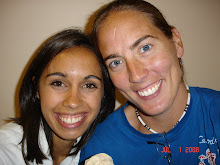
The most heart-breaking experiences here seem to happen when you are interacting with the kids. Maybe their innocence makes the hopelessness and pain more obvious, or maybe we just see kids outside the callous stereotypes that we seem to develop in relating to one another as adults. Whatever the reason, it happened to me again today at the beach.
Jes and I took a trip to a beach town about 4 hours southwest of
Phnom Penh. We were just hanging out on the beach and attempting to talk our way out of buying all the stuff people were trying to sell us. One little girl came selling some snacks. She carried a flat basket filled with the chips and dried fruit she needed to sell on her head. She is eight years old and her name is Kay. She looked so tiny next to the other children and adolescents selling things on the beach, but she was tough…pushing her goods, making sure she had all her money and that she didn’t take any bills that were too dirty or torn back to her mother. She looked stressed and a bit overwhelmed when things didn't go as planned in carrying out her responsibility in helping to provide for her family.

Kay sold us some treats and stayed around for a while. I talked to her a little bit in Cambodian, and Jes kept talking to her in English. She loved practicing her English and eventually came up next to Jes and drew the lines of a tic-tac-toe square in the sand. She and Jes began playing tic-tac-toe all over the beach. Then they drew pictures in the sand. Eventually, they began playing a game similar to hopscotch. It was amazing to watch the change that took place. As she began playing, she left her basket of goods next to me on th

e sand (I’m glad she trusted us so much especially in area with so much theft), and seemed to become a different person. She went from a street-hardened, frustrated, overly burdened girl taking on adult responsibilities to an endearing little 8 year-old child with a tender heart and a smile to match it! She laughed, explored, left her basket behind, and became creative. It was like magic. And there I was sitting on a mat on the beach in a small little town in
Cambodia crying because I have just seen a miracle.
I sat there and wondered what would become of her obvious talents and artistic sensitivity without opportunities to develop those gifts. Now I wonder how long it will be before she no longer remembers how to put her basket down and go play, b

efore she forgets what it means to trust, and before she becomes a product of survival rather than the spring of creativity that was evident today. I cried tears of sorrow for Kay and the difficult life she has before her. I cried for the countless others like her, wanting to hope for their future but feeling the despair and hopelessness that they are always fighting in their own lives. If I feel the struggle to have hope in the possibilities for their futures from where I stand with experiences, vision, optimism, and resources, how do I expect little Kay to have hope in something she has never seen before…not in her own life or in the lives of her family members and friends?
I am grateful t

o have witnessed the beauty of a child today, and I am still working to make sense of what I experienced. Maybe for now it is enough to have experienced it. Still I hope that these experiences, both beautiful and painful, change me. However, I know this kind of change is not a passive process, and I am left with more questions everyday. What do experiences like this mean about my life? How do I make sense of the poverty and suffering here? And what will become of little Kay?
 aside and have a good time. They tease and laugh and work through arguments the way I have seen so many other children do. They play until they roll on the ground laughing or s
aside and have a good time. They tease and laugh and work through arguments the way I have seen so many other children do. They play until they roll on the ground laughing or s it there panting trying to catch their breath. They don’t have very many “toys” here so the children have learned to be resourceful. They play a lot of games that don’t involve any special equipment or training. The games that need equipment usually require a shoe, a rock,
it there panting trying to catch their breath. They don’t have very many “toys” here so the children have learned to be resourceful. They play a lot of games that don’t involve any special equipment or training. The games that need equipment usually require a shoe, a rock,  or a single ball. Today, I played with some kids by a lake in Siem Riep as they jumped a rope made out of vines tied together into a long string. Simplicity and creativity are the keys to the games that these kids have mastered, and they will always welcome you into the fun…if you can keep up with them!
or a single ball. Today, I played with some kids by a lake in Siem Riep as they jumped a rope made out of vines tied together into a long string. Simplicity and creativity are the keys to the games that these kids have mastered, and they will always welcome you into the fun…if you can keep up with them!















































